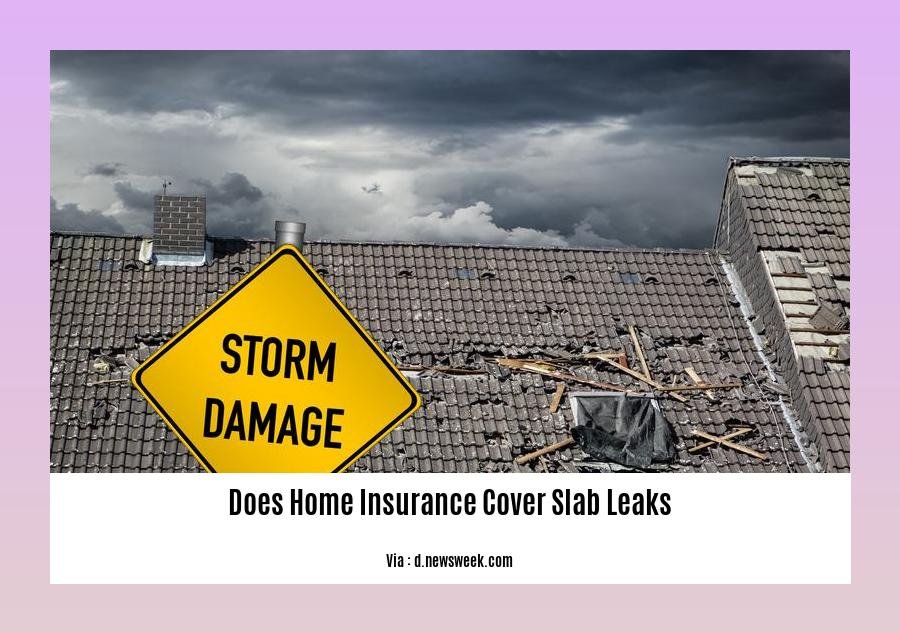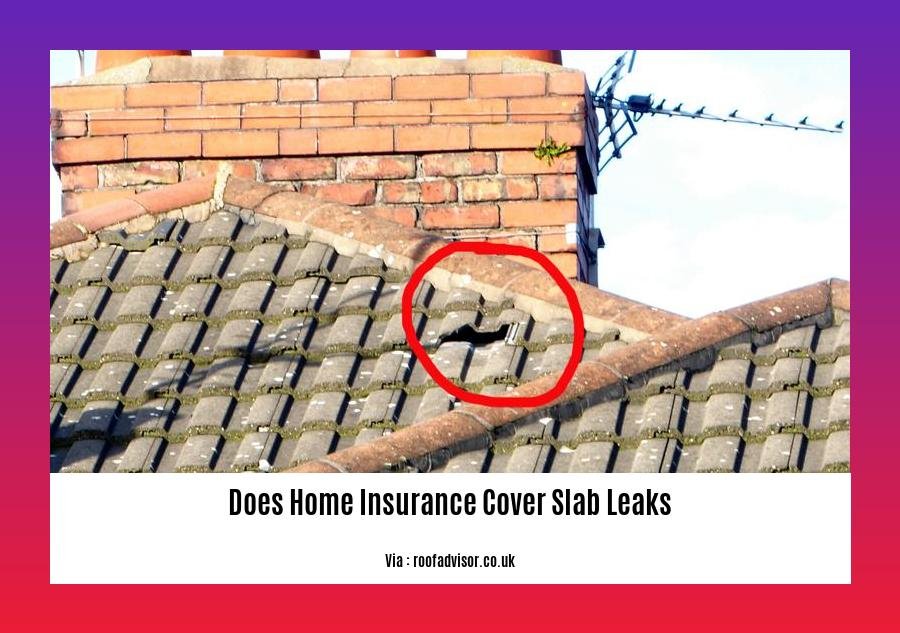Does Home Insurance Cover Slab Leaks: A Comprehensive Guide for Homeowners – Slab leaks can turn out to be costly and disrupt the tranquillity of homeowners, leading to anxiety and financial burdens. This comprehensive guide delves into whether home insurance can provide coverage for slab leaks, helping homeowners navigate the complexities of insurance policies and claims processes.
Key Takeaways:
-
Home insurance commonly covers slab leaks as a common peril, similar to events like lightning, wind, fire, and theft.
-
Insurance covers water damage caused by the leak, including damage to personal belongings and property.
-
Fixing the leak itself may not be covered, depending on the cause of the leak and the policy’s terms.
-
Dwelling and personal property coverage in homeowners insurance may be applicable for slab leaks.
-
Insurance coverage is influenced by the leak’s cause, the policy’s level of coverage, and any policy exclusions.
-
Unrepaired slab leaks can lead to extensive foundation damage, causing soil erosion and concrete cracking.
Does Home Insurance Cover Slab Leaks: Your Questions Answered

You’ve invested your hard-earned money into making a house your home. It’s only natural that you want to protect it from life’s unexpected events, and that’s where home insurance comes into play. But what exactly does it cover, and more specifically, does home insurance cover slab leaks? Let’s dive in!
What are Slab Leaks Anyway?
A slab leak is a frustrating problem that occurs when a pipe underneath your house’s foundation, often called a slab, springs a leak. Think of it as a hidden plumbing issue that can wreak havoc on your home’s structure and interiors. Since these pipes are concealed beneath the foundation, they can be tricky to detect and repair.
So, Does Home Insurance Cover Slab Leaks?
In many cases, the answer is a comforting yes, home insurance policies often cover slab leaks. Insurance companies typically consider slab leaks as a “covered peril,” grouping them with common hazards like fire, lightning, wind, and theft. This means that if a slab leak causes damage to your home and belongings, your insurance may step in to help you recover from the financial burden.
What’s Covered by Home Insurance in a Slab Leak Scenario?
When a slab leak strikes, your home insurance typically covers:
- Water Damage Repair:
-
Your policy may cover the costs of repairing or even replacing damaged drywall, flooring, furniture, and other personal belongings that fall victim to the leak’s wrath.
-
Leak Detection and Repair:
- While some policies may pitch in for the expense of detecting and fixing the leak itself, others might exclude this, so it’s worth examining the fine print of your policy.
Factors Affecting Coverage for Slab Leaks
- Cause of the Leak:
-
Insurance companies are sticklers for details, and the cause of the slab leak can determine coverage. For instance, if the leak stems from faulty plumbing, it may be excluded from coverage.
-
Type of Coverage:
-
The extent of coverage varies across insurance policies, so it’s crucial to understand what yours offers. Some policies may provide comprehensive coverage for slab leaks, while others might offer limited or no coverage.
-
Exclusions in Your Policy:
- Policies often include specific exclusions, which are events or situations not covered by the insurance. Make sure you’re familiar with these exclusions to avoid surprises down the road.
What Should You Do If You Have a Slab Leak?
- Act Fast:
-
Time is of the essence when it comes to slab leaks. The longer you delay addressing the issue, the more extensive the damage can become.
-
Call Your Insurance Company:
-
Reach out to your insurance provider promptly to initiate the claims process. They’ll guide you through the steps and inform you about the coverage you’re entitled to.
-
Document the Damage:
-
Take photos and videos of the damage caused by the slab leak. This documentation will be instrumental in your insurance claim.
-
Hire Qualified Professionals:
-
Engage the services of licensed plumbers and contractors to detect the leak’s source and repair it efficiently.
-
Review Your Policy:
- Take this opportunity to thoroughly review your home insurance policy. Make sure you fully comprehend the coverage details and any limitations or exclusions that may apply.
Remember, every insurance policy is unique, so it’s essential to consult your insurance provider for a clear understanding of your specific coverage. By staying informed and taking prompt action, you can navigate a slab leak situation with confidence, knowing you have the support of your home insurance policy.
-
Discover the truth about whether home insurance covers septic systems with this detailed guide.
-
Uncover the facts about home insurance coverage for structural damage in our comprehensive analysis.
-
Explore the intricacies of home insurance coverage for structural problems and understand your options.
-
Delve into the world of homeopathy’s effectiveness in treating hair loss and make informed decisions about your hair care regimen.
Limitations of home insurance coverage for slab leaks.

Ever found yourself wondering, “Hey, does my home insurance cover slab leaks?”
You’re not alone. Slab leaks are a huge bummer, and the insurance coverage can be a maze. Let’s explore the limitations together.
1. Source of the Leak:
Insurance companies often scrutinize the source of the leak. If it’s caused by normal wear and tear, faulty construction, or lack of maintenance, you might be out of luck. They want to ensure the damage isn’t due to negligence.
2. Gradual Seepage vs. Sudden Burst:
Insurance companies aren’t big fans of gradual seepage. They prefer sudden and accidental bursts. Gradual leaks often stem from long-term neglect, making them ineligible for coverage.
3. Specific Policy Exclusions:
Keep your eyes peeled for exclusions in your policy. Slab leaks caused by earthquakes, floods, or sewer backups might be explicitly excluded. Read the fine print thoroughly.
4. Coverage Limits:
Home insurance policies usually impose coverage limits. Even if your policy covers slab leaks, there might be a cap on the payout. Make sure the coverage aligns with the potential repair costs.
5. Deductibles and Timeframes:
Brace yourself for deductibles. You’ll have to pay a portion of the repair costs out of your own pocket before the insurance kicks in. Plus, there might be time limitations for filing claims, so act swiftly.
Key Takeaways:
– Know the leak’s source: Normal wear and tear, faulty construction, and lack of due diligence can lead to denial.
– Sudden vs. gradual: Sudden and accidental bursts have a higher chance of coverage than gradual seepage.
– Exclusions matter: Read the fine print. Exclusions like earthquakes, floods, or sewer backups can leave you uncovered.
– Coverage limits: Check the policy limits. Ensure they align with potential repair costs.
– Deductibles and timeframes: Be ready to pay the deductible. File claims promptly to avoid missing deadlines.
Need more info? Check out:
Allstate
MoneyGeek.com
What to do if you have a slab leak.
Have you ever wondered what to do if you have a slab leak? A slab leak is when a pipe that runs beneath the foundation of your home or building starts to leak water. This can be a serious problem, potentially causing extensive damage to both your property and your wallet.
Key Takeaways:
-
A slab leak is a leak in a pipe that runs beneath the foundation of your home or building.
-
Slab leaks can cause extensive damage to your property and can be expensive to repair.
-
Home insurance may cover the damage caused by a slab leak, depending on the terms of your policy.
-
If you suspect you have a slab leak, it’s important to take action quickly to prevent further damage.
If you suspect you might have a slab leak, there are some steps you should take:
- Turn off your water main: This will help stop the leak and prevent further damage.
- Contact a qualified plumber: They can locate and repair the leak, and they might be able to help you file an insurance claim.
- Call your insurance company: Most home insurance policies cover slab leaks, but it’s important to check your policy to be sure.
- Document the damage: Take photos and videos of the damage, and keep all receipts for repairs.
Some additional tips:
- If you’re having trouble finding a plumber, you can contact your local water company. They may be able to refer you to a qualified plumber.
- If you’re having trouble getting your insurance company to cover the damage, you can file a complaint with your state’s insurance department.
Source
Source
Tips for preventing slab leaks and choosing a home insurance policy.
If you’ve stepped on a damp spot in your house and wondered if it’s a slab leak, I’m right there with you! But what exactly is a slab leak? Let’s break it down: slab leaks are hidden plumbing issues underneath your foundation, where pipes may spring a leak. These can lead to a host of problems, so let’s dive into how to prevent them and ensure you have the right home insurance policy.
Preventing Slab Leaks:
-
Inspect Regularly: Keep a keen eye on your home’s foundation for cracks or leaks. Catching issues early can save big bucks.
-
Mind Your Water Pressure: High water pressure puts extra strain on pipes, increasing the risk of leaks. Get it tested and regulated if needed.
-
Insulate Pipes: Especially in colder climates, insulating pipes helps prevent freezing and subsequent leaks.
-
Landscape Wisely: Avoid planting trees or shrubs too close to your foundation. Their roots can grow into pipes and cause leaks.
-
Water Heater Check-Ups: Keep an eye on your water heater. A faulty water heater can lead to leaks in your slab.
Choosing a Home Insurance Policy:
-
Review Your Policy: Check your current policy. Most standard home insurance policies cover slab leak damage, but it’s always good to double-check.
-
Understand Exclusions: Policies often exclude gradual leaks or damage caused by lack of maintenance. Make sure you understand what’s covered.
-
Consider Additional Coverage: Some policies offer additional coverage for slab leaks, providing peace of mind and protection. If you’re worried about slab leaks, consider adding it.
-
Consult an Insurance Agent: If you’re unsure about your coverage or want to discuss slab leak coverage options, reach out to your insurance agent. They’re there to help!
Key Takeaways:
-
Home insurance policies usually cover slab leak damage caused by sudden, accidental events (covered perils) but may exclude gradual leaks or damage from lack of maintenance.
-
Homeowners can prevent slab leaks by regularly inspecting their foundation, maintaining proper water pressure, insulating pipes, landscaping wisely, and keeping an eye on their water heater.
-
Choosing a home insurance policy involves reviewing the current policy, understanding exclusions, considering additional coverage, and consulting an insurance agent for expert advice.
-
Preventing slab leaks and selecting the right home insurance policy ensure homeowners are financially protected against the potential costs of slab leak repairs or damages.
Sources:
FAQ
Q1: Does homeowners insurance generally cover slab leaks?
A1: Home insurance policies often provide coverage for damages caused by slab leaks if they result from covered perils like sudden and accidental events. However, the specific terms and conditions of the policy determine the extent of coverage.
Q2: What type of slab leak causes are typically covered by insurance?
A2: Insurance coverage for slab leaks varies based on the policy. Some common covered causes include sudden and accidental water leaks, burst pipes due to freezing temperatures, and damage caused by covered events like earthquakes or floods.
Q3: Are slab leaks caused by gradual deterioration or lack of maintenance covered by insurance?
A3: Typically, insurance companies exclude coverage for slab leaks resulting from gradual deterioration, wear and tear, or lack of maintenance. Pre-existing conditions or issues not disclosed during the policy application process may also be excluded.
Q4: How can I determine if my homeowners insurance covers slab leaks?
A4: Contacting your insurance provider to discuss the specific circumstances of the slab leak and the coverage options is recommended. The cause of the leak and the specific terms of the policy determine coverage eligibility.
Q5: What should I do if I have a slab leak and want to file an insurance claim?
A5: If you experience a slab leak, promptly notify your insurance company and provide detailed information about the cause of the leak and the resulting damage. Cooperate with the insurance company’s claims process to ensure a smooth resolution.
- Dora the Explorer Wipe-Off Fun: Safe & Mess-Free Activities for Little Explorers - April 18, 2025
- Does Lemongrass Repel Mosquitoes? Fact vs. Fiction + How to Use It - April 18, 2025
- Do Woodchucks Climb Trees?Fact vs. Fiction - April 18, 2025










